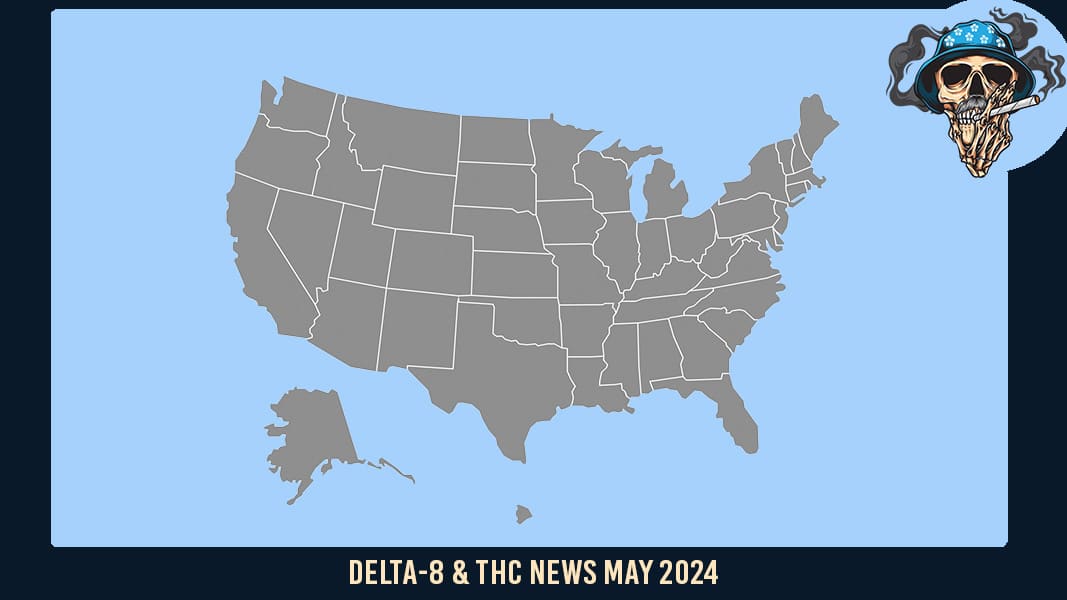Delta 8 News May 2024
Delta-8 THC: Q&A with MUSC Scientists Who Study Cannabis
In a detailed Q&A session at MUSC, scientists specializing in cannabis studies discussed the nuances of Delta-8 THC, a lesser-known cannabinoid compared to Delta-9 THC. They emphasized Delta-8 THC’s milder psychoactive effects, which some users prefer for reducing anxiety while maintaining focus and alertness. The discussion also covered legal aspects, safety profiles, and the need for more research to understand Delta-8 THC’s benefits and risks fully. This comprehensive analysis aims to educate both the public and healthcare providers about the potential and limitations of Delta-8 THC.
You can read the full article on MUSC’s website for more detailed insights.
DEA Says ‘THCA Does Not Meet The Definition’ Of Legal Hemp?
In a recent article on Marijuana Moment, the DEA clarified that THCA does not meet the definition of legal hemp under current regulations. This comes as Congress considers recriminalizing certain cannabinoids in the Farm Bill. The DEA states that because THCA converts to THC upon decarboxylation, it must be included when assessing a cannabis product’s THC levels for legal compliance. This stance poses significant implications for the hemp industry, potentially impacting many growers and producers.
Hemp THC Products Face Ban Under Farm Bill Amendment
An amendment proposed to the U.S. Farm Bill could significantly impact the hemp industry by banning the sale of hemp-derived delta-8 THC and other intoxicating products. Introduced by Illinois Republican Rep. Mary Miller, this amendment aims to distinguish between “hemp grown for cannabinoid extraction” for non-intoxicating purposes and “industrial hemp” used for fiber and food. This change could have severe consequences for the $28 billion hemp product industry if passed. For further details, read the full article on Ganjapreneur.
Connecticut Mandates Inventory for THC-Infused Beverages
Connecticut has implemented a new requirement for all businesses dealing with THC-infused beverages to take a comprehensive inventory of their stock. By May 14, 2024, these businesses must report their total inventory and a $1 per container fee to the Department of Consumer Protection. This inventory is part of a broader regulatory framework to enhance oversight of the sale and distribution of cannabis-based products.
The move is designed to ensure compliance with state regulations and to help monitor the quantities of THC-infused products within the market. It also aims to streamline the management of cannabis products, which have seen increased popularity and distribution. The fee collected will likely be used to support regulatory activities and ensure that these products are sold responsibly and safely.
This regulatory step reflects Connecticut’s cautious approach to managing cannabis and hemp products as they become more integrated into commercial spaces. Businesses involved are urged to comply with the inventory requirements by the specified deadline to avoid penalties. More details on the regulation can be found on the official Connecticut government portal here.
DEA’s Rescheduling of Marijuana Sparks Debate on Medical Value
Despite the U.S. Health and Human Services Department (HHS) recommending that marijuana be reclassified to a less restrictive category under federal law, the Drug Enforcement Administration (DEA) appears hesitant about its medical value. This decision is part of a larger review involving detailed analyses of marijuana’s medical usability and abuse potential. While the move could lead to changes in how marijuana is regulated, the DEA’s final say in this process highlights ongoing debates about the substance’s benefits and risks.
For a more detailed look into the developments, read the full article on Marijuana Moment here.
Texans Boost New Mexico’s Cannabis Industry Amid Static Texas Laws
Since New Mexico legalized recreational cannabis in April 2022, there has been a significant influx of Texans contributing to the state’s burgeoning market. This cross-border dynamic has notably fueled sales, with many Texans traveling to New Mexico to purchase cannabis due to the strict prohibition in their own state. Despite the economic benefits seen by New Mexico from this interstate exchange, there appears to be little movement toward cannabis law reform in Texas, where conservative leadership maintains a firm stance against legalization.
This situation highlights the economic and policy disparities between neighboring states, which can lead to significant cross-border traffic and economic interactions in regions where cannabis is legalized adjacent to areas where it remains restricted. As New Mexico continues to develop its cannabis industry, the lack of similar progress in Texas policy could maintain or even increase the flow of consumers and capital across state lines.
You can find the original article on KERA News here.
Virginia’s Hemp Regulation Debated by Fourth Circuit
The Fourth Circuit Court is reviewing Virginia’s hemp regulations, which have sparked controversy due to perceived conflicts with federal laws that generally prohibit states from establishing their own stringent hemp controls. This judicial review highlights the ongoing tension between state initiatives to regulate hemp and federal legislative frameworks intended to oversee its cultivation and sale across the United States.
For more detailed information, you can read the full article on Courthouse News Service here.
FDA Panel Reviews MDMA for PTSD Treatment
An FDA advisory panel is reviewing the potential use of MDMA, commonly known as “molly” or “ecstasy,” for treating PTSD. The psychedelic drug, historically popular at parties, could offer significant benefits in controlled therapeutic settings. The panel’s consideration marks a pivotal moment in potentially shifting the drug’s image from a party substance to a legitimate medication for psychological conditions.
You can read the full article on NBC News.
California and Missouri Step-Up Regulations on Delta-8 and Related Substances
California and Missouri are the latest states aiming to impose restrictions on delta-8 THC and other similar unregulated, synthetic cannabinoids. This movement reflects a broader national concern about these substances, often termed ‘diet weed’, which are not adequately regulated and have raised safety concerns due to their psychoactive effects. These states are joining almost 30 others who have initiated similar measures to control these products.
The growing apprehension stems from reports of adverse effects associated with the consumption of these products, which include synthetic versions of THC derived from hemp. Poison control centers across the United States have reported nearly 8,000 cases of adverse reactions from 2021 to 2023, underscoring the potential public health risks.
Both states are taking steps to navigate the complex regulatory landscape around hemp and its derivatives, reflecting a broader push towards ensuring consumer safety and establishing clear legal frameworks for intoxicating substances derived from hemp. This regulatory scrutiny aligns with a nationwide trend where states increasingly demand clarity and safety in the rapidly evolving cannabis and hemp product markets.
For more detailed information, you can read the original article on HempToday here.
Current Cannabis Legislation Developments in Louisiana, Hawaii, and Georgia
Recent legislative developments across the United States, Louisiana, Hawaii, and Georgia are advancing significant changes in their cannabis policies. Louisiana has initiated steps to potentially legalize marijuana through recent bills that could pave the way for a regulated market. Meanwhile, Hawaii has shown progress by moving legislation forward that would decriminalize the possession of small amounts of marijuana, marking a shift towards less stringent penalties.
Georgia, on the other hand, is considering adjustments to its medical marijuana program, which could expand access and streamline the distribution processes for patients. This comes amidst a broader national conversation on the need for reform in cannabis banking and finance laws, which impacts all states looking to modernize their cannabis industries.
These states are part of a larger trend in which different regions are reassessing their stance on cannabis, influenced by public opinion and the potential economic benefits of a legal cannabis market. As the landscape continues to evolve, these legislative actions are crucial in shaping the future of cannabis policy in the United States.
You can read the full article on The Dales Report here.


